


|
| ||
|
|
|
|
|
|
SILVER EDITION

|


|
SILVER EDITION |
|
Publication History
Cover Overview |
Reviews and Previews
Chapter Overview |
Word Cloud
[NEW]
First Chapter Preview [NEW] |
Cover Gallery (year)
Cover Gallery (edition) |
 Cover Overview
Cover Overview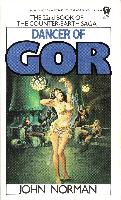
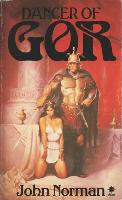
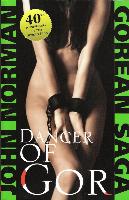
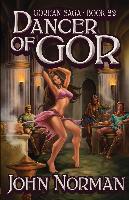
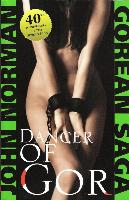
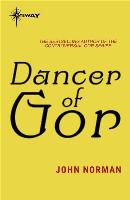

 Reviews and Previews
Reviews and Previews Chapter Overview
Chapter OverviewHere is an overview of the 34 chapters in Dancer of Gor:
|
1. A Bit of Silk
2. The Dictionary 3. The Library 4. The Whip 5. Training 6. Transportation 7. Brundisium 8. The Platform; The Annex to the Sales Barn 9. The Sales Barn; The Block; The Cage 10. The Kitchen 11. The Raffle; The Alcove; The Kennel 12. The Floor 13. The Passageway; Intrigues 14. Punishment 15. The Hood and Leash 16. Thieves 17. The Square of Market of Semris |
18. The Grating; The Garments
19. The Streets of Argentum; The Belly Chain and Disk 20. The Key in the Belt 21. The Panels 22. Inquiries; Gagged, Hooded and Collared 23. The Work Camp 24. In The Work Camp 25. In the Tent of the Overseer 26. Mercenaries 27. The Pen; Outside the Pen 28. The Well 29. The Meadow 30. The Slave Wagon 31. Placation; In the Slave Wagon 32. The Camp 33. Dust 34. Love |
 Word Cloud
Word CloudThe image below shows the most often used words and terms within Dancer of Gor. The larger the size, the more often the word or term occurs in the text.
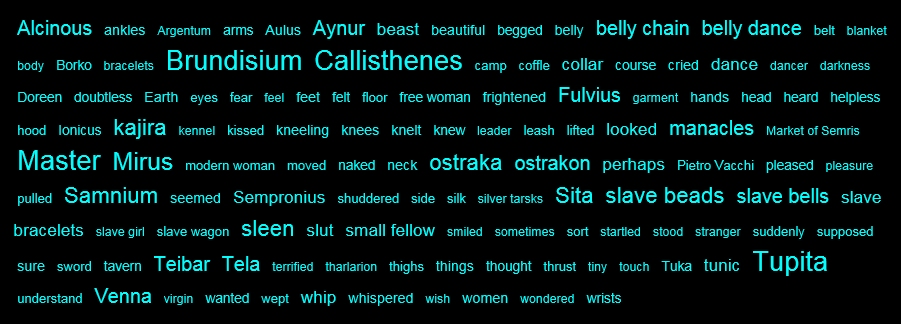
 First Chapter Preview
First Chapter Preview
1
A Bit of Silk
I knew that I did not conform to the cultural stereotypes prescribed to me. I had known this for a long time. The dark secrets which lay hidden within me I had been forced to conceal for several years. I do not know from whence the secrets arose. They were directly contrary to everything that had been taught to me. Their origins, it seemed, were deep within me, and, I feared, as I lay awake at night afraid, sweating and distraught, native to my very nature. But such a nature, I wept, could not be, and if it were, so subtle, so insistent, so persistent, so unrelenting, so tenacious, it must never be admitted, never, never! Yes, I fought them, these secrets, these covert knowledges, these anticipations, these dreams. Yes I struggled, in accord with the demands of my culture, my training and education, these things telling me how I must be, how I must be as I was told to be, to drive them from me. I repudiated them, again and again, but to no avail. They returned, ever again, mercilessly, horrifying me, taunting and mocking me, stripping me in the darkness of my bed of my pretenses and lies. I squirmed and thrashed in my bed, twisting and weeping, pounding it with my fists, crying out, "No! No!" Then I would put my head fearfully on my pillow, dampened with meaningless, rebellious tears. Could I be so weak and terrible? Could I be truly so different from others? Surely there could be no one in the world so degraded, so shameful and terrible as myself. Then one night I rose from bed and went to the vanity and lit the small candle there. I had bought this candle weeks before, probably because deep within me, within my deepest self, in my anguished mind, in my tortured breast and heart, I knew this night would come. I lit the small candle. I stood there in the flickering light, for some minutes, looking at myself. I wore a white nightgown, anklelength. I have dark hair and eyes. At that time my hair was cut at shoulder length. Then, not looking back to the mirror, I crept in the candlelight and shadows to the dresser and there, from beneath several layers of garments, where I had concealed it, I drew forth a small bit of scarlet cloth, tiny and silken, with shoulder straps, a garment I had myself sewn weeks ago, one in which, save for fittings, often done by feel, with my eyes closed, I never even dared to look upon myself. This, in a sense, was the third such garment I had attempted. The material for the first, not yet even touched by needle and thread, or scissors, I had suddenly discarded in terror, months ago. I had actually begun work on the second garment, some two months ago, but, in touching it to my body, for it was the sort of garment which touches the body directly, with no intervening investiture, I had suddenly, comprehending its meaning and nature, begun to shake with terror and, scarcely knowing what I was doing, I feverishly cut and tore it to pieces, and threw it away! But even as I had destroyed it I knew, weeping and distraught, terrified, I would make another. I took the third garment from the drawer. Suddenly I thrust it back in the drawer, again under the other garments, thrusting shut the drawer. Then, after a moment, breathing heavily, trembling, I opened the drawer again, and removed it, once more, from its place. I went back to the vanity not looking in the mirror. I dropped the bit of scarlet silk near my feet on the rug. I was trembling. It seemed I could scarcely get my breath. I lifted my eyes then again to the figure in the mirror. She was not large, but I thought she might be pretty. But it is hard to be objective about such things. I supposed there could be criteria, of one sort or another, in some place or another, of a somewhat ascertainable, quantitative sort, perhaps what men might be willing to pay for you, but even then they would probably be paying for a spectrum of desirabilities, of which prettiness, per se, might be only one, and perhaps not even the most important. I did not know. I suppose even more important would be what a woman looked like to a given man and what he thought he could do with her, or, seeing her, knew he could do with her. I looked at the figure in the mirror. Her nightgown, anklelength, was of white cotton. It seemed rather demure, or timid, I supposed, but there was little doubt that there was a female, and perhaps a rather attractive one, though, to be sure, that would be a judgment for men to more properly make, within it. There were the stains of tears on the cheeks of the girl facing me in the mirror, I noted. She trembled. Her lips moved. Why was she afraid? At what she saw in the mirror? It was herself, surely. Why should she fear that? I saw she wore a nightgown. I liked that. I did not like pajamas. To be sure, she was perhaps too feminine for a woman in these times, but then there are such women, in spite of all. They are real, and their needs are real. I looked at her. Yes, I thought, she was objectively pretty. There was no doubt about it. To be sure, she might not seem so to a crocodile or a tree but she should seem such to a male of her species, and that was what counted. Yes, that was what counted, objectively. To be sure, he would doubtless wish to see if the rest of her matched her face. Men were like that. They were like traders of horses and breeders of dogs, interested in the whole female. I again regarded the girl in the mirror. Yes, I thought, she was too feminine, at least for these times. This was not the sort of woman wanted in our times. She was like something beautiful stranded on a foreign beach. Surely she belonged in another time or place. She seemed in her hormones and beauty, in her needs, like a stranger flung out of time. There she stood in a world alien to her deepest nature, not a man, and not wanting to be one, a victim of time and heredity, of her genetic depths, of biology and history. How lonely and unbefriended, how frustrated, unfulfilled and doleful she was. How tragic is she indeed, I thought, whom the lies of one's time fail to nourish. I looked again at the girl in the mirror. Surely she might better have cooked meat in the light of a cave fire, the thongs on her left wrist perhaps marking whose woman she was, or with sistrum and hymns, under the orders of priests, welcomed the grand, redemptive, sluggish flows of the Nile; better she had run barefoot on a lonely Aegean beach, her himation gathered to her knees, a fillet of white wool in her hair, watching for oared ships; better she had spun wool in Crete or cast nets, her robes tied to her waist, off the coast of Asia Minor; better she had broken her dolls and put them in the temple of Vesta; better she had been a silken girl breathless behind the wooden screens of the seraglio or a ragged slut on her knees desperately licking and kissing for coins in the sunlit, dusty streets below; better she had been bartered for a thousand horses in Scythia or led to Jerusalem tied by the hair to a Crusader's stirrup; better to have been a high-born Spanish lady forced to beg to be the bride of a pirate; better to have been an Irish prostitute, her face slashed by Puritans for following the troops of Charles; better to have been a delicate lady of the Regency carried into Turkish slavery; better to have been a Colonial dame spinning in Ohio, looking up to see her first red master. I put down my head, and shook it. Such thoughts must be put from my mind, I told myself. But the girl stood there, still stood there, in the mirror. She had not left, or fled. How bold she was, or how deep were her needs! I shuddered. How many times I had awakened from sleep, moving against the coarse, narrow cords which had held me down, above and below my breasts and crossed between them, leaving their cruel marks on my body! How many times had I awakened, seeming still to feel the tight bite of cruel shackles on my wrists and ankles. How many times had I, bound at their mercy, looked up at them? How many times had I recoiled from the blows of their whips, only to crawl then to their feet, piteous and contrite, begging to please them? I was a female. Not looking in the mirror I drew off the nightgown and held it clenched in my hand. I then crouched down and put it gently on the rug, beside the bit of silk. I hesitated. Then I picked up the bit of silk and, standing, not looking in the mirror, I drew it on. It was on me! I closed my eyes. I felt on my skin its silken presence, almost nothing, little more than a whisper or a mockery. I drew it at the hem down more against my body, perhaps defensively, that I might feel it on me the more, that I might assure myself, I told myself, the more of its presence, that I was truly garmented, but this, too, of course, merely confirmed upon me not uncertainly the insidious disturbing subtlety of its slightness, the so undeniable, so insistent, scandalous feel of it, its shameful, mocking silken caress, and, too, as I drew it down, it clung more closely about me; it seemed that it would then, almost as though scornfully, imperiously, in amusement, given its nature, respond to my efforts at modesty only by producing a further and yet greater revelation and betrayal of my beauty. I stood there, the garment on. I turned then to the mirror, and opened my eyes. Suddenly I gasped and was giddy. For a moment it seemed blackness swam about me, and I fought for breath. My knees almost buckled. I struggled to retain consciousness. I looked in the mirror. Never had I seen myself thusly. I was terrified. In the mirror there was a different woman than the world knew of me, one they had never seen, one they had never suspected. What was that thing she wore? What sort of garment could that be, so delicious and brief, so excruciatingly and uncompromisingly feminine? Surely no real woman, hostile, unloving, demanding, shrill and frustrated, zealous in her conformance to stereotypes, attempting desperately to find satisfaction in such things, would wear such a garment. It was too female, too feminine. How could she be identical to a male in such a garment? It would show her simply that she was not. How could she keep her dignity and respect in such a garment? She could not. It would show that she was beautifully, and utterly and profoundly different from a man. It was the sort of garment a man might throw to a woman to wear, amused to see her in it. What sort of woman, of her own free will, would put on such a garment? Surely no real woman. It was too feminine. Surely only a terrible woman, a low woman, a shameful, wicked, worthless woman, a reproach to her entire sex, one with depths and needs antedating her century, one with needs not indexed to political orthodoxies, one with needs older and deeper, and more real and profound, more ancient and marvelous than those dictated to her by intellectual aberrations antithetical to biology, truth, history and time. I put my hand before my mouth, frightened. I stood there, regarding myself, then, shamed, and humbled and thrilled. I knew then it was I in the mirror, and none other. Perhaps what I saw was not a real woman in some invented, artificial, contemptible, grotesque modern sense, but I thought she was a woman nonetheless and one in some even more profound sense, so small, so soft and curved, and desiring, and vulnerable, and helpless and needful, a sense not indexed to criteria of economics and politics, not to the demands of platforms and parties, not to the likings of frustrates and freaks, but to something more profound, something deeper, to ancient, precious, biological womanhood, and its fundamental nature. If what faced me in the mirror was not a real woman in some contemporary, transient, idiosyncratic political sense, it was at least something biologically far deeper, and a thousand times more real, a true woman. And standing there I was suddenly very frightened, for I realized suddenly, the thought never before having struck me in just the same way, and with the same suddenly significant force, that there were two sexes, and that they were quite different. I regarded myself in the mirror, and trembled, wondering what this might mean, fully. I feared to consider the matter. What did it mean, that we were not the same as men, that we were so different? Was this really totally meaningless, a unique accident in the history of a world, a random paragraph written in the oceans, in the records of steaming swamps, in the journals of primeval forests, in the annals of the grasslands and deserts, of vacillating glaciers and damp, flowering valleys, of the basins of broad rivers and of the treks of nomads, wagons and armies, or were there biological proprieties, destinies and natures to be fulfilled? I did not know. But I knew how I felt. I lowered my hand and turned, slowly, before the mirror. I considered myself, and was, truly, not displeased. I was not a man, and did not want to be one. I was a female. I choked back a sob. I wondered what it might mean, that men, until we had managed to turn them against themselves, until we had managed to tie and cripple them, were so much stronger, so much more powerful, than we. There was no nether closure, by intent, in the tiny garment I had fashioned. It was open at the bottom. This had seemed to me necessary, somehow, when I had made it. That had seemed to me interesting at the time, but I thought that now I might more fully understand its meaning. It was the garment, particularly in its brevity, of a woman who, whether she willed it or not, was to be kept open to the touch of a man. It was, in its way, a convenience for the male, indeed, even an invitation to his predation; too, similarly, it was, to her, to the so-dressed female, a mnemonic device, and a symbol of her vulnerability, and nature, reminding her of what she was, and her meaning. I wondered if anywhere there might be true men, men capable of answering the scream of need in a woman, capable of taking us in hand and treating us, and handling us, as what we were, females. Alas, I did not think so. Before the mirror I sobbed. Then I thought that somewhere, surely, there must be such men. But where? Surely, somewhere in nature, there must be such men! Surely somewhere in nature there must be an explanation for my needs. I had not invented them. I was their captive! Surely somewhere in nature there must be an accounting for them, as there was an accounting for the dances of bees and the fragrance of flowers, for the fleetness of the antelope and the teeth of the lion, for the migrations of fish and birds, for the swarming of insects, for the turning of turtles to the sea. Somehow there must be a reason for the way I felt, something beyond all the denials, denunciations and rationalizations. Such needs bespoke something deep within me, but I dared not consider what it might be. I was lonely and miserable! I wondered if somewhere in nature there might lie not only an explanation for these needs, so seemingly mysterious and inexplicable, given my environment, my education, my training, my conditioning, so different from them, but also some dark complement to them, some response to them, or answer to them. Did they not belong in some organic whole, in some natural relationship, selected for throughout time and history? The bee's dances betokened an avenue to nectar; the fragrance of the flower, seemingly such a meaningless thing of beauty, called forth, luring the bee to its pollen; the swiftness of the antelope paid tribute to the ferocity and agility of the carnivore, the fangs of the carnivore to the elusiveness of his quarry; at the ends of migrations lay the spawning waters and nesting grounds of species; swarmings brought sexes into proximity; and meaning was given to the trek of the turtle, as it led at last to the sea. I considered what might be the answer, the response, in nature, to the needs I felt, if there was one, what might be the nature of the startling organic whole, if it existed, the natural relationship, if there should be such, in which they figured. I wondered what might possibly be the complement in nature to these overwhelming, undeniable, persistent things within me, which had so distressed and troubled me, which now so obsessed me, which caused me such anguish, these irresistible calls and cries within me, the agonizing needs I felt, and I shuddered. I looked in the mirror. How brazen she was to see herself in such a garment! I wondered how she might look, so clad, or perhaps in less, to a man. Suddenly she seemed small, and beautiful, and so vulnerable, and unutterably desirable. I sensed then what might be the nature of the complement in nature to my needs, what might be their flower, their sea, their carnivore, and I stood there terrified, sensing the imperiousness of that complement, its power, its uncompromising ferocity, what it might be to be its object, and knowing that if it existed it would have its way and be absolutely served.
How pleased I was, then, that surely no such complement could exist, that I was safe. I had nothing to fear.
I continued to look at the girl in the mirror. She was exquisite, I thought. She is beautiful, I thought, standing there in the brief silk, in the candlelight, so softly revealed. I had not realized she was so beautiful. I had never seen her before, it seemed, thusly. I had not guessed how marvelous she might be. Yes, it is fortunate that men such as those in my dreams do not exist, I thought, for what then, beauty, would be your fate at their hands? I considered what I might look like, with a chain on my neck. Such men, I thought, would take few chances of losing you, Doreen. Doubtless you would be kept in superb custody, if even the least sort of escape were remotely conceivable. I wonder if you would learn quickly to serve them well, according to their tiniest caprices. Yes, I thought, I would learn quickly and well. It would not be pleasant to feel their whips. I wept then, again, wondering if perhaps I had not been born elsewhere, perhaps time and time again, in other times, if I had not lived in Egypt or Sumer, or Chaldea, in rocky Hellas, or verdant Sybaris or bustling Miletus, if I had not been kept in the great palace in Persepolis, if I might not have seen Alexander, kneeling to him as a Persian slave, if I might not, a barbarian girl, have entered Rome in chains, herded before the chariot of a general, gracing with others his triumph, if I might not, as a Moslem girl, have served Crusaders in some remote fortress, or, as a Christian slave, found myself shamelessly exhibited and sold in an Arab market, thence to be taught to dance for masters.
Then I put such thoughts from my head. I did not think the explanation for my needs, the mysterious things within me, which were so different from what I had been taught, could be so complex, or simple, as racial memories, or the memories of individuals whom I might have been in other places and times. They were rather, I suspected, though I could not know, a simple heritage of my sex, but there was this to be said, had I lived in another place or time I might perhaps have found female fulfillments which, categorically, it seemed, were to be denied to me in my present world, the neuteristic, anonymous world, so inimical to individuality and love, in which I found myself a prisoner of time and circumstance.
I looked into the mirror, and smiled. To be sure, I thought, perhaps you were once an Irish girl tied between the benches of a Viking ship, bound for Iceland, or a pale, prim English lady carried to Barbary, in 1802, who will be taught to feel, and serve dark masters in helpless ecstasy, but perhaps, too, you were not. That was she, and not really you. But who are you? Is there a ship somewhere that will come for you? Are the chains forged that will bind your limbs? Is there an iron, somewhere, waiting to be heated, which will mark your body? Is there a collar, somewhere, unknown to you, that you will someday know well, because it has been locked on your neck? I wonder. You are beautiful. I do not think men would be patient with you. They would want superb service, with no hesitation or compromise. You are that beautiful. Be pleased that men do not exist such as in your dreams, Doreen, for in their power, and in their arms, you would be raped, humiliated and unspeakably degraded. You do not know, responding helplessly to them, what they might make you, what you might become. You would be owned, like a pig or dog. What you might become, I laughed, scornfully. What you might become? How pretentious you are! Do you think I do not know you, who you are, and what you are? Perhaps what you are is hidden from all the world, but it is not hidden from me! I know you, and what you are! Speak honestly or be beaten! What you might become, indeed! What you might become, I retorted, you already know in your heart, and know it fully well, you petty, lovely hypocrite, you already are!
The girl in the mirror looked startled, and then pouting, and angry.
"Is it not true?" I challenged her.
"Yes!" she sobbed. "It is true!"
"Are you not rather burdensomely garbed?" I asked.
She drew off the tiny bit of silk. I watched her in the mirror. "You may dance," I told her.
She looked at me, defiantly.
"You want to dance," I told her. "Dance."
I then, in the candlelight, on the rug, before the mirror, silently, to no music but what was in my own heart, danced. I danced my need, my anguish, my frustration, my misery, my loneliness.
"Now," I said, "dance, if you dare, as what you are!"
I then, startled, saw her, myself, in the mirror. "Who are you?" I asked. "Who taught you to move like that? Where did you come from? Can you be truly Doreen? You are not Doreen as I have seen her before. Are you I? Are we the same? Surely that cannot be I! No one showed you such a dance! Has there been such a dance lurking in you all this time? Can we be the same? Surely that cannot be! Surely I must stop! You are the Doreen I must conceal, the Doreen whom I must, whatever be the cost or anguish, never permit to be seen, or even suspected! You are the Doreen I must deny. You are the Doreen I must hide! Yet you are my true self. I know that! It is my true self then that I must deny, and hide!"
I watched her.
"You bitch!" I chided her. "You brazen bitch! You meaningless, brazen little bitch!"
I watched. How shameless, how meaningless, how terrible, how worthless she was, that girl in the mirror, that writhing, astounding, uncontrollably sensuous little bitch!
She continued to dance.
I saw that she was worthless indeed, worth less than the dirt beneath the feet of gods, but that, too, in her way, she possessed incredible riches and power, in her beauty and femaleness, and in her dance. In the sense in which a free person was priceless, she was worthless, but, too, in her way, I could see that she would have value, value as a pair of boots might have value or a dog. She was the sort of person who would have a finite, measurable value. She was the sort of woman on whom a fair price could be put.
I collapsed to the rug, naked. I felt its coarse nap on my thigh and side. I clutched my arms about myself. I drew my legs up. I was terrified. I wept. I could not understand what I had done, and seen. The girl in the mirror was now gone. We were now one. I trembled.
I lay there for better than an hour, I think, in the flickering shadows, naked, on the rug. I listened to the sounds from outside, mostly those of traffic. Eventually the tiny candle burned out.
After a time I rose to my knees. I knelt there on the rug with my head down. It was a submissive posture. I then raised my head, miserably. "My masters," I whispered to the darkness, "I am here! Where are you?"
I then rose to my feet and crept to my bed. I lay there for a time and then, later, fell asleep.
 Cover Gallery (year)
Cover Gallery (year)Here is a cover gallery showing all the editions and printings of Dancer of Gor, sorted by year of publication. Click on any cover to see the book.


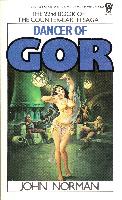
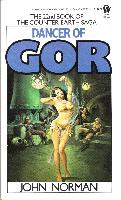




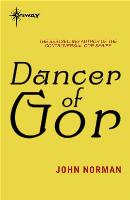

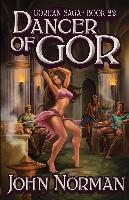


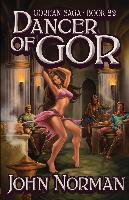

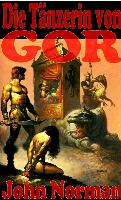
 Cover Gallery (edition)
Cover Gallery (edition)Here is a cover gallery showing all the editions and printings of Dancer of Gor, sorted by edition. Click on any cover to see the book.
















 This page is copyright © 2000/2013 by Simon van Meygaarden & Jon Ard - All Rights Reserved
This page is copyright © 2000/2013 by Simon van Meygaarden & Jon Ard - All Rights Reserved